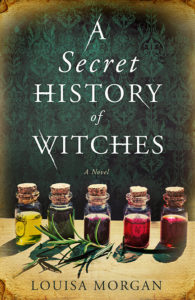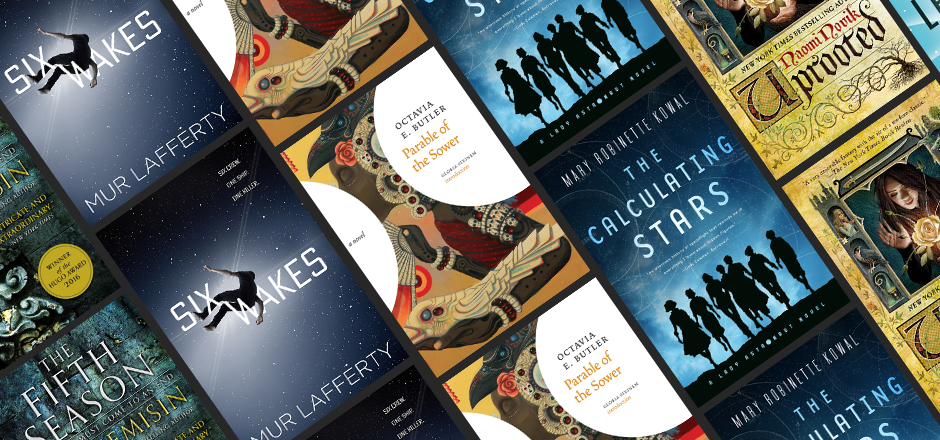Louisa Morgan’s A Secret History of Witches follows five generations of the Orchiére lineage, beginning in 1821 with Nanette Orchiére and winding its path over a century later to the beginnings of World War II with Veronica Selwyn. What makes the Orchiére women so special is the fact that they’re witches, their power passed down from mother to daughter throughout the decades. The daughter gains her power when she hits puberty, and she, like her ancestresses before her, must not only learn how to hone and wield this power, but keep it a secret from those who’d do their family harm.
 To put it bluntly, I’m a sucker for a good witch story, and I’m also really into generational tales. Putting the two together? I’m in.
To put it bluntly, I’m a sucker for a good witch story, and I’m also really into generational tales. Putting the two together? I’m in.
This was an easy book to get sucked into. At risk of utilizing an overused phrase, it’s a page-turner. From page one we’re dropped in the middle of a high-stakes scene, with the current matriarch Ursule, Nanette’s grandmother, protecting her clan from a group of witch-hunters that are on their tail – and the intrigue doesn’t stop there. I was captivated by Nanette’s story and watched her grow from a little girl into a young woman who eventually learns of the family craft. After Nanette came her daughter Ursule, followed by her daughter Iréne, and so on and so forth. The story is quite literally what it says on the tin: a secret history of witches.
To that effect, sometimes the story grew repetitive: girl is confused by the secrets her mother is keeping, girl finds out about said secret, girl receives powers at puberty, girl hones her magic but must hide it from ignorant outsiders. By the third daughter’s tale I already had a mental outline prepared for how her narrative would play out – and for the most part, it did. But what keeps even this repetition interesting is that each girl has a different reaction upon learning about her family lineage. Some are skeptical, others apathetic, and others hungry for the chance to use that power. Their reactions to witchcraft – especially Iréne’s – are major factors that influence how the rest of their narrative will unfold.
Still, I was glad when Morwen, Iréne’s daughter and the fourth one in the book’s lineage, broke the mold a little bit with her rebellious nature. At that point the predictability of the narrative was starting to wear thin – but then it truly veered somewhere different with Veronica, the fifth and final Orchiére of the novel.
Veronica, as mentioned above, arrives on the scene in 1937, and so her section of the book takes place during the tumultuous years of World War II in England. Without giving away any spoilers, Veronica becomes a crucial part of the war effort, and her participation is vital to the Allied forces. Whereas the other Orchiére women had narratives with relatively little excitement outside their personal social circles, Veronica is smack dab in the middle of a global conflict. It’s no surprise, then, that hers is the longest section of the book – which is why the ending disappointed me.
Again, no spoilers here, but after almost 500 pages of engaging with entire generations of these women – women who you get to know on an intimate level – the book flounders and ends with a weak whimper of a final scene rather than the grand send-off I felt it deserved. Perhaps Morgan was trying to invoke the more intimate feel of the previous witches’ stories, but ultimately it didn’t work for me. I feel like an epic generational tale of secrecy and witchcraft should have an equally epic ending; Witches didn’t deliver on this front.
What it did deliver on, though, was the emotional, familial hook. With the exception of Iréne (boy howdy did I hate Iréne), I really felt for all of these women – women who are ultimately just trying to survive in a world that is afraid of and thereby violent towards them. When I was reading the more contemporary sections, I found myself thinking of the older generations like Nanette and Ursule, wondering what they must think of their lineage now. Were they proud of where the Orchiére line ended up? Were they disappointed? How much of their wisdom was passed on and how much was lost over the decades? The generational thread is where this book truly shines.
Ultimately, A Secret History of Witches is a strong and engaging book. While it does falter and peter out at the end, you’ll still be hooked by these women. The importance and theme of family, as well as the intimate insight into their turbulent lives, gives this book an emotional foundation that makes you want to be with the Orchiéres wherever they go.
4 out of 5 stars
This review contains affiliate links. While Girls in Capes does make revenue from purchases made at affiliate links, reviews are not paid, and all reviews contain the staff writers’ honest opinions of the work.





